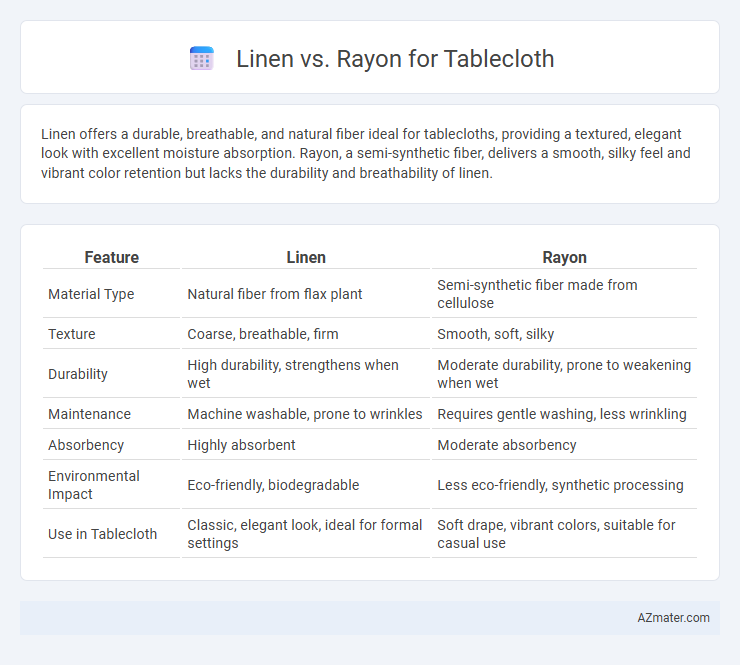Linen offers a durable, breathable, and natural fiber ideal for tablecloths, providing a textured, elegant look with excellent moisture absorption. Rayon, a semi-synthetic fiber, delivers a smooth, silky feel and vibrant color retention but lacks the durability and breathability of linen.
Table of Comparison
| Feature | Linen | Rayon |
|---|---|---|
| Material Type | Natural fiber from flax plant | Semi-synthetic fiber made from cellulose |
| Texture | Coarse, breathable, firm | Smooth, soft, silky |
| Durability | High durability, strengthens when wet | Moderate durability, prone to weakening when wet |
| Maintenance | Machine washable, prone to wrinkles | Requires gentle washing, less wrinkling |
| Absorbency | Highly absorbent | Moderate absorbency |
| Environmental Impact | Eco-friendly, biodegradable | Less eco-friendly, synthetic processing |
| Use in Tablecloth | Classic, elegant look, ideal for formal settings | Soft drape, vibrant colors, suitable for casual use |
Introduction to Linen and Rayon Tablecloths
Linen tablecloths, made from natural flax fibers, offer durability, breathability, and a distinctive textured elegance ideal for formal and rustic settings. Rayon tablecloths, derived from semi-synthetic cellulose fibers, provide a smooth, lightweight, and affordable alternative with vibrant color retention but less resistance to wear and moisture. Choosing between linen and rayon hinges on balancing preferences for natural fiber strength and eco-friendliness versus cost-effective versatility and visual appeal.
Key Differences Between Linen and Rayon
Linen tablecloths, made from natural flax fibers, offer exceptional durability, breathability, and a textured, elegant appearance that improves with each wash, making them ideal for long-term use. Rayon tablecloths, derived from semi-synthetic cellulose, provide a smooth, silky finish and vibrant color retention but tend to wrinkle easily and may require more delicate care. The key differences lie in linen's strength and natural fiber origin contrasted with rayon's softness and susceptibility to moisture damage.
Durability: Which Fabric Lasts Longer?
Linen offers superior durability for tablecloths due to its strong natural fibers, which become softer and more resilient with each wash, resisting wear and tear over time. Rayon, a semi-synthetic fabric, tends to weaken and show signs of damage more quickly, especially when exposed to moisture and frequent laundering. Choosing linen ensures a longer-lasting tablecloth that maintains its appearance and structural integrity even with regular use.
Appearance and Texture Comparison
Linen tablecloths offer a natural, slightly coarse texture with visible fibers that create an organic, rustic aesthetic ideal for casual or elegant settings. Rayon tablecloths provide a smooth, silky surface with a subtle sheen, giving a more polished and luxurious appearance while feeling softer to the touch. The breathable, weighty feel of linen contrasts with the lightweight, flowing drape of rayon, influencing both the visual impact and tactile experience on dining tables.
Maintenance and Care Requirements
Linen tablecloths require gentle washing in cold or lukewarm water and should be air-dried or tumble-dried on low heat to maintain their natural fibers and prevent shrinkage. Rayon tablecloths demand more cautious care, often needing hand washing or dry cleaning to avoid fabric distortion and loss of softness. Both materials benefit from ironing while slightly damp, but linen is more durable and resists pilling compared to rayon, which can be more delicate and prone to damage from harsh detergents or high temperatures.
Environmental Impact and Sustainability
Linen, derived from flax plants, is highly sustainable due to its low water usage, minimal pesticide requirement, and full biodegradability, making it an eco-friendly choice for tablecloths. Rayon, often produced from cellulose of wood pulp, involves chemically intensive processes and chemicals that can harm the environment unless sourced from responsibly managed forests using closed-loop production methods. Choosing linen over rayon promotes environmental health by reducing chemical waste and supporting renewable agricultural practices.
Cost and Value Analysis
Linen tablecloths typically have a higher upfront cost due to the natural fibers and durability they offer, providing long-term value through their strength and resistance to wear and tear. Rayon tablecloths are more budget-friendly initially but may lack the same longevity, often requiring replacement sooner, which can increase overall expenses. Evaluating cost against lifespan and aesthetic quality reveals linen as a more cost-effective choice for frequent use despite its initial price.
Stain Resistance and Cleanability
Linen offers natural stain resistance due to its tightly woven fibers that prevent liquids from penetrating quickly, making it easier to blot spills before they set. Rayon, being more absorbent and delicate, tends to retain stains longer and requires gentler cleaning methods to avoid damage. When choosing tablecloth fabric, linen provides superior ease of cleaning and durability against stains compared to rayon, which demands more careful maintenance to preserve its appearance.
Best Uses for Linen vs Rayon Tablecloths
Linen tablecloths excel in formal settings and outdoor events due to their durability, natural texture, and moisture-wicking properties, making them ideal for weddings, fine dining, and rustic-themed gatherings. Rayon tablecloths offer a soft, silky feel with vibrant color retention, suitable for casual dining and decorative purposes where budget-friendly elegance is desired, though they may require delicate care. Choosing linen ensures longevity and a natural aesthetic, whereas rayon provides affordability and a smooth finish for less formal occasions.
Conclusion: Choosing the Right Fabric for Your Table
Linen offers durability, breathability, and a natural texture ideal for formal or rustic table settings, while rayon provides a smooth, silky finish with vibrant colors suited for elegant occasions. Consider linen for eco-friendly, long-lasting use and rayon for affordable, visually striking tablecloths that drape well. Selecting the right fabric depends on your desired aesthetic, maintenance preference, and event type, ensuring a perfect balance between style and functionality.

Infographic: Linen vs Rayon for Tablecloth
 azmater.com
azmater.com